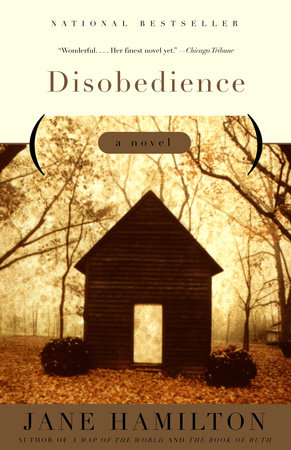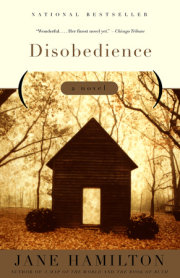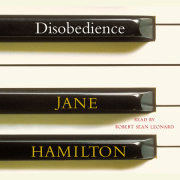Chapter One
Reading someone else's e-mail is a quiet, clean enterprise. There is no pitter-pattering around the room, no opening and closing the desk drawers, no percussive creasing as you draw the paper from the envelope and unfold it. There is no sound but the melody of the dial-up, the purity of the following Gregorian tones, and the sweet nihilistic measure of static. The brief elemental vibration that means contact. And then nothing. No smudge of ink, no greasy thumbprint left behind. In and out of the files, no trace. It could be the work of a ghost, this electronic eavesdropping.
I was the boy in the family and therefore, statistically, the person most likely to seize upon the computer culture, the child to wire the household, tune it into our century, keep the two systems, one for me, the other for the rest of the Shaws, up and running. Elvira, my sister, was detail oriented and analytical and could have easily outdistanced me if only she'd had the desire. She had the intelli- gence, certainly, to learn complex languages, to program, to hack. But through most of the time I was living at home she was scornful of technology, stuck, as she was, in 1862 with her Civil War infantry regiment, the 11th Illinois. At a young age, much to my mother's sorrow, Elvira became a hardcore Civil War reenactor.
It was I who begged and moped a little and pleaded for some kind of computer, a dud, a two- or three-year-old dinosaur—anything would do. I built myself a cardboard replica of the first Macintosh model, and for a good half hour at a stretch I lay on my bed typing on the paper keys, pretending to write programs that would win me fame and fortune. When I was nine, I appealed to my grandmother in a simple poor-boy letter: my grandmother, the one money bag we all in our particular ways went to, again and again, a source that seemed inexhaustible and at the ready. When the box arrived on our doorstep, I sat patiently with my parents showing them the fundamental maneuvers—dragging the mouse, clicking the mouse, see Mommy and Daddy double-click the mouse—as if the two of them were babies being prodded through an ordinary developmental stage.
Several years later with my own money, I seriously upgraded. I had to lure my mother to her own e-mail account with the promise that she'd have satisfaction and even happiness. It was still early days for the kind of communication we now take for granted. Wizard that I was, I guaranteed her pleasure. I provided the password for her so she could commune with her musician friends, the hip ones, so she could have her circle of intimates right in front of her without having to go down to the end of the town. For her screen name I did away with her flat, no-crackle name, Beth, and from the full Elizabeth plucked the zippy Liza, attached her age to it, Liza38. I told her it sounded like the code name of a blond spy with a sizable bust, someone operating out of what used to be East Germany. When I was fourteen and fifteen, I liked to think that what was surely my sophisticated sense of humor had blossomed into its fullest dark and ironic potential. But big-busted-floozy spy jokes were not my mother's style. She was not herself well endowed, and from my point of view she was no seductress. She smiled at my attempt at wit: Nice try, Henry. Although she would but of course retain her dear perfection no matter what name she used, Richard Polloco, the lover, took to the pizzazz of her screen self and often called her Liza38.
When I first stumbled into her e-mail file, I didn't mean to. It was accidental. It was about as easy to type in her password as mine. I wasn't even thinking. I had no plan, nothing premeditated, no scheme in place. I realized my error as the icons slowly formed before me in their beamy pleased way. It was through my fingers that I understood the misstep. "Welcome," our provider said. My hands froze above the keys. And again the voice. "You've got mail." You've got mail. What was the old girl up to? I suppose that thought went through my mind.
I can't say for certain what the first message revealed, or even whom she had written. Because it was not only messages from Richard Polloco and messages meant for Richard Polloco that I read during that time, but others too, e-mails that my mother wrote to her friend Jane, hundreds, thousands of words, to explain, to justify, to excuse herself. What I do remember is the letter, a real United States Postal Service letter that I found in the box in the hall, the place we put outgoing mail. I noticed it because it was addressed to him, to Richard Polloco, in Tribbey, Wisconsin. My mother was in the kitchen making up a shopping list, and she must have set it there for just a minute. Richard Polloco. I already knew enough to think, I shouldn't pick this up, and I don't want to pick this up, and How can I keep from picking this up? I held it to the light, and I could see the scrap of paper inside. I could see the scrap, the size of a stamp, so small you couldn't write more than a single word on it. That's what I thought: What did she write that could be more than a single word? I held the envelope up in part because it was seemingly empty. At the angle, with the aid of the lamp, it was impossible not to see that single word on the slip of paper. You. That's all she had written. But that single word had weight. I knew enough by then to understand, to feel, if I'd wanted to, the ache in that short word.
It is true that the subject of love, generally, is exhausted, but a person can still go on for a good long time about the specifics of a love scene, including the setting and then who said what and why, and how it made the listener feel. One of the first e-mails I read, and perhaps the very first one, was my mother's message to her friend Jane, back in Vermont. "This is an old story," she began. "There is nothing new in it." What she was doing, she said, was hardly noteworthy because it had been acted and reenacted countless times before. For me, during that year, the story had no elements that felt in any way worn.
I don't believe that everything a person has seen and done is stored in the brain, there to retrieve if only you can pick the right lock. In fact, I blame the brain for making us as selective as we are, for editing out what we don't want to hear, for refusing to take hold of what could be the important detail. Still, if I have forgotten the first message, I have the sense of what it could have been. "This is an old story," my mother began. "There is nothing new in it." The seemingly shopworn tale my mother inhabited did not stop her from recounting, through the year, at great length, her feelings, her guilt, her despair, as well as the particulars—terrible in their vividness—of her journeys to see Richard Polloco in Wisconsin. Rpoll, he was, at luge.com.
This is how our family was back then, not so long ago, less than a decade ago: Elvira Shaw, thirteen; myself, Henry Shaw, seventeen; Beth Gardener Shaw, thirty-eight; Kevin Shaw, forty-three. We had moved from a small town in Vermont to Chicago when I was fourteen. My parents seemed to feel that the upheaval, the trauma, of moving from one culture to another, from Mercury to Pluto, in effect, was worth it for all of our educations. I still ask myself regularly what it was, actually, that they were thinking. My father is a high school history teacher, a job that combines the skills of preaching, mudslinging, acting, and arm-twisting. You take his American history survey course and you can never again celebrate a holiday such as Columbus Day or Memorial Day or Presidents' Day with any sense of national pride. After my father has done his song and dance, you know more than you wanted to about the roughly 9 million Native Americans who died between 1642 and 1800. You are filled with disgust, dismay, and self-loathing because a complex civilization, a creative and by and large generous civilization, was wiped out. My father was offered a position at the Jesse Layton School in the tony Lincoln Park neighborhood in Chicago. At the time I didn't catch the detail that he'd been fired from his job in Vermont, probably because too many of his students felt disgust, dismay, and self-loathing after learning about their heritage.
No problem, to move from the Northfield mountains, pure granite, from a town of 317, to a Midwestern city of 7 million built on a swamp. What, really, were they thinking? If we were going to go urban, my parents figured we might as well bypass the suburbs and do it up right. Without much discussion, as was her way, my grandmother purchased a brownstone for us on the upscale block of Roslyn Place near the Jesse Layton School. Minty, we called my grandmother, dollar signs blinking in our eyes. It was I, as a toddler, who parsed Grandmother Gardener down to the essential component. It goes without saying that we all wanted to be as close as we could to the aging matriarch, she who ruled with her iron hand from Lake Bluff, Illinois.
As far as the Jesse Layton parents went, the school was basically a front for the Democratic Party, for rich bleeding-heart liberals. If Kevin Shaw couldn't live on a racially balanced street, at least he was given free reign to teach as he pleased, to turn out little socialists from his class to his heart's desire, with the understanding, of course, that the firebrands would someday settle down and become responsible Democrats. Although his salary was modest, he believed his position at Layton had many elements of the dream job.
My mother, for her part, was interested in moving back home to the Midwest because of the cold and snow of the Vermont winters and the mud of the Vermont springs and the black flies of the Vermont summers. Not to mention all year round the warp we lived in, somewhere between the hardscrabble life of the real Vermonters and the artiste vacationers, giddy with their views and the mountain air and their leisure. My mother was ready to leave all of it, and it was a fine time, because the band she played in had gone through a difficult period and split up. She was free of them. Not least, I think she believed that if we stayed in Vermont, her tomboy daughter would one day take off into the hills with nothing on but a loincloth, nothing but her bare hands and sharp new canines to get herself some bloody grub.
Many friends expressed sympathy for us both before and after the move. They had the idea that Elvira and I were being wrenched away from Eden, taking that long fall from the fragrant warm garden to the gritty gray world where, it is true, Elvira would have to wear clothes. Fully dressed and in a brownstone, we would be cramped. Outside we would be in danger from both the careless ways of the rich and the careless ways of the poor. Chicago would be beautiful in a man-made way, but the splendor would hardly be noticeable because of the exhaust and the grime and the noise and the litter. The natives jogged with their dogs and could not break their strides to clean up after them; it was no better, probably, than a medieval city, the chamber pots being emptied out of windows right into the street. And there would be people, people everywhere. That would be the worst of it, I thought, the feeling that you were always in some- one's company. But I got tired of what seemed like pity, and I did want to point out to the chorus that Wellington, Vermont, was hardly Shangri-La, that at the church suppers in Wellington you could get a hot dish with beets called red flannel hash. Furthermore, the librarian, Mrs. Hegley, based on her extensive knowledge of her neighbor's moral behavior, either excused her patrons their fines or did not. My father had been a selectman, and I had heard enough of his conversations about the difficulty in getting monies for the school, for the library, for much of anything beyond snow removal within a week of a storm. Both my parents, I knew, worried about my education and my sensibility in a community where I was the only boy in school during deer-hunting season.
All this is not to say that Wellington wasn't a good place and that I don't still miss it. I was taken from Vermont before I could think to want to leave it myself, and so for me Wellington is the ideal, my old backyard there my deepest sense of home. Right away after the move I longed for it, in spite of the fact that I'd been in a conspicuous position, the kid of a proselytizing socialist schoolteacher and a city-slicker piano-playing mother. To make matters worse, we had no television, not that, as my mother used to say, I didn't absorb most everything I needed to understand about our culture by respir- ing. Inhale, I got The Simpsons, exhale Beavis and Butt-head; inhale Letterman, exhale MTV, every single song, every single leer. When we finally did get a television, when we moved to Chicago, I watched it that first summer, up in my parents' room, without moving from the bed.
. All rights reserved. No part of this excerpt may be reproduced or reprinted without permission in writing from the publisher.









